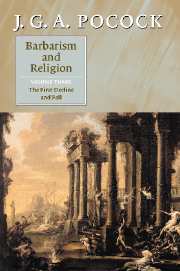Book contents
- Frontmatter
- Contents
- Acknowledgements
- Note on usages
- List of abbreviations
- Introduction
- PROLOGUE
- 1 Gibbon's first volume: the problem of the Antonine moment
- PART I THE FIRST DECLINE AND FALL: ANCIENT PERCEPTIONS
- 2 Alibi quam Romae: the Tacitean narrative
- 3 The Gracchan explanation: Appian of Alexandria and the unknown historian
- 4 The construction of Christian empire
- PART II THE AMBIVALENCE AND SURVIVAL OF CHRISTIAN EMPIRE
- PART III THE HUMANIST CONSTRUCTION OF DECLINE AND FALL
- PART IV EXTENSIVE MONARCHY AND ROMAN HISTORY
- PART V REPUBLIC AND EMPIRE: THE ENLIGHTENED NARRATIVE
- PART VI GIBBON AND THE STRUCTURE OF DECLINE
- EPILOGUE
- Bibliography of works cited
- Index
3 - The Gracchan explanation: Appian of Alexandria and the unknown historian
Published online by Cambridge University Press: 15 December 2009
- Frontmatter
- Contents
- Acknowledgements
- Note on usages
- List of abbreviations
- Introduction
- PROLOGUE
- 1 Gibbon's first volume: the problem of the Antonine moment
- PART I THE FIRST DECLINE AND FALL: ANCIENT PERCEPTIONS
- 2 Alibi quam Romae: the Tacitean narrative
- 3 The Gracchan explanation: Appian of Alexandria and the unknown historian
- 4 The construction of Christian empire
- PART II THE AMBIVALENCE AND SURVIVAL OF CHRISTIAN EMPIRE
- PART III THE HUMANIST CONSTRUCTION OF DECLINE AND FALL
- PART IV EXTENSIVE MONARCHY AND ROMAN HISTORY
- PART V REPUBLIC AND EMPIRE: THE ENLIGHTENED NARRATIVE
- PART VI GIBBON AND THE STRUCTURE OF DECLINE
- EPILOGUE
- Bibliography of works cited
- Index
Summary
We know that ancient historiography was a rhetorical art, built around the eloquent narrative and exposition of military, political and moral action. We also know that Gibbon inhabited a neo-classical culture, in which the same idea of narrative exercised great authority over the writing of history; but we have been exploring and elaborating the scheme proposed by Arnaldo Momigliano, in which narrative was joined by two other kinds of history, the philosophic and the antiquarian. The last of these may be further subdivided, into the critical apparatus proposed by philology and erudition, and the archaeology of past states of language, law and culture uncovered by grammarians, jurists and humanists. Out of these in particular, we suggested, emerged narratives of systemic change which provided historiography with general patterns of change and causation, and so became part of what we mean by philosophic history. In studying the Greco-Roman historians of whom Gibbon made use, it is of some importance to decide how far such patterns can be found in them, how far these were read into them by early modern historians of whom Gibbon was one.
Patterns of general change imported into history were certainly not unknown in antiquity; it has been usual to think of them as Greek, imported into Roman history, and it happens that most surviving accounts of the Roman civil wars and the end of the republic are in Greek.
- Type
- Chapter
- Information
- Barbarism and Religion , pp. 32 - 60Publisher: Cambridge University PressPrint publication year: 2003



